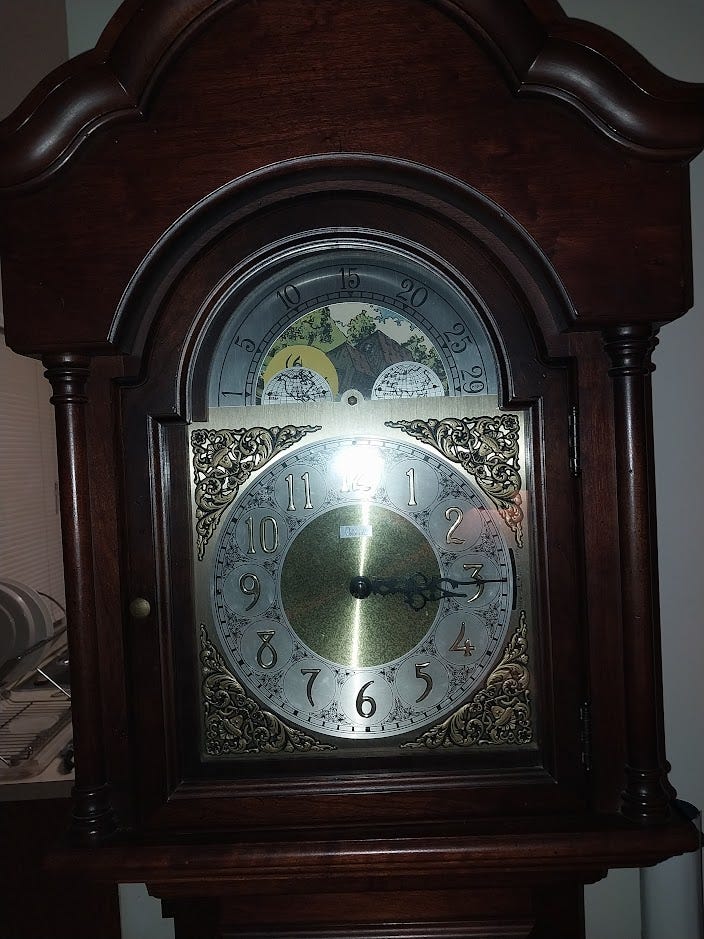Of Winchester Chimes
Fading of History
One of my side hobbies is mechanical clocks. I largely came across the hobby as an accident. My grandfather and uncle repaired such clocks so I was always familiar with their operation. In 2008, the housing crisis happened and people were doing vast amount of downsizing and eliminating household items like clock.
I found grandfather clocks in disrepair going for cheap. The owners, not knowing how to put the clock in working order or find a service person, considered such clocks as a big paper weight not worth moving. I was stunned and alarmed. Most clocks only needed modest repairs or adjustments so I started repairing them and taking ownership of the most unique ones.
Most of these clocks are actually grandmother clocks, just short in height of being a true grandfather clock, but having all the same essential features. There use to be many makes and the older ones are more durable and robost with sound. However, by the 1970s as inflation raged, metal prices were high, and the quality of the clocks declined.
At the same time, the quartz clock revolution was in full swing and would be followed by the internet and smart phones. Today, the young have no idea how to process the old analog clock dial as shown below:
In the midwest, such chiming clocks are uncommon. In the southern states, they are far more popular where people doing manual labor could track their time by the sound of the chimes. Today, such a approach to time management is largely gone, and with it, the love of the various chimes.
The Westminister chimes are the most common, but they are also known as the Cambride quarters!
But the most rarest of common chimes are the Winchester chimes. If you have a clock with such chimes, preserve it. You may find it abbreviated as Winch. These chimes were first played as Winchester Cathedral in 1093 . The Norman conquerors of England did not like the cathedral chimes of the Saxons, so Bishop Walkilin, a kinsman of William the Conqueror, demolished and rebuilt the Winchester chimes in 1093. The cathedral’s central tower fell in 1107 but soon was rebuilt. This edifice forms a substantial part of the present cathedral, located in Hampshire, England. You can actually view the Norman Cathedral at (https://maps.app.goo.gl/VdDiDsX5BgRfrbRY7).
Yet, I am finding fewer clocks with Winchester chimes and those I do find, have old worn out parts, without any acceptable replacement movements as the existing movements in production do not offer Winchester chimes. This is sad and really needs to change.
There is one other critical matter which has harmed the love of mechanical clocks: daylight savings time. The impact caused me to write a poem, called Silence.
Silence
The silence is deafening, if not outright alarming.
The house sounds like death, as time stands still.
There is no tick. There is no tock.
There is no bim. There is no bam.
What a misery this silence is!
Mr Westminster, Mr. Winchester and Mr. Wittington have gone mute and dumb.
The bells of St. Michael's do not ring. Not one bell does chime.
An hour of silence has befallen my home.
But not to worry, the hour must end.
From saving daylight time, to spending time, change has come.
I had to stop the clocks for an hour to turn them back to standard time.




I have a Howard Miller grandfather clock
my late wife and I bought together for our 29th Anniversary. It has three tunes:
- Westminster
- Whitt.
- St. Mich.
Does not appear to include Winchester. (I can’t get by the rifle!) Not sure anymore what the other two abbreviations stand for:
- Whittenberg? (Sp?)
- Saint Michael?
PS: I have hated Daylight Savings Time since it was (Re)introduced in 1954! My parents continued to make me go to bed at 8:00, when it was still light, and my buds still were out playing. 😡
You have something in common with Doc Martin.